The Yearly Cycle
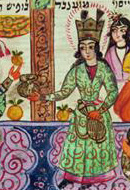 Purim Puzzles
Purim PuzzlesFriday, March 11, 2011 by Lawrence Grossman | Jewish Ideas Daily » Daily Features
Purim, Judaism's strangest holiday (which this year falls on March 20), is prescribed by what may be the strangest book in the Hebrew Bible, the scroll (m'gilah) of Esther. Two public readings of the book, one at night and the other in the morning, tell a story of Persian palace intrigue in the fifth century B.C.E., a recitation accompanied by the holiday's decidedly unspiritual noisemaking, tippling, and masquerade.
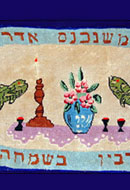 Of Calendars and Controversy
Of Calendars and ControversyThursday, February 10, 2011 by Michael Carasik | Jewish Ideas Daily » Daily Features
It's the month of Adar, and in Jewish tradition, the beginning of Adar always means an "increase in joy." After all, the festive holiday of Purim, on Adar 15, is just two weeks away—or would be in a normal year.
 From New Year to Arbor Day
From New Year to Arbor DayWednesday, January 19, 2011 by Moshe Sokolow | Jewish Ideas Daily » Daily Features
The holiday of Tu Bishvat ("the fifteenth of Shvat") falls this year on Thursday, January 20. What are its origins, and when and why did it become incorporated into the calendar as the Jewish "Arbor Day"?
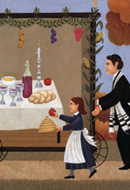 Be Joyful
Be JoyfulTuesday, September 21, 2010 by Yehudah Mirsky | Jewish Ideas Daily » Daily Features
Alongside the more colorful and distinctive rituals of the Sukkot festival—the taking-up of lulav and etrog, the sukkah itself—there is another command, less concrete and more penetrating: "And you will rejoice." Indeed, the passage in Deuteronomy (16: 14-15) concludes, v'hayita akh sameah, translatable as "you will be altogether joyful," or even "you will be only joyful."
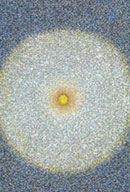 Creations
CreationsTuesday, September 7, 2010 by Yehudah Mirsky | Jewish Ideas Daily » Daily Features
Rosh Hashanah, the beginning of the year, marks the creation of the world. Or does it? The Torah refers to Rosh Hashanah, although not by that name, as the first day of "the seventh month" (Leviticus 23:24)—the seventh, that is, if you're counting from Nisan, the month of Passover. That month is designated as the beginning of the year in the first act of the Exodus: "This month will mark for you the first of the months; it will be, for you, the first month of the year" (Exodus 12:2). Like revolutionaries everywhere, the Israelites wanted a new calendar.
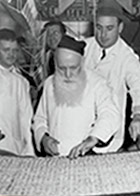 Thoroughly Modern Matzah
Thoroughly Modern MatzahThursday, March 25, 2010 | Jewish Ideas Daily » Daily Features
When Jews the world over sit down next week to mark the birth of Jewish history, matzah will figure prominently at the table. Matzah baking is an exacting task; according to traditional law, the entire process, from first kneading to exit from the oven, must be accomplished in 18 minutes flat, with not a speck of leaven in sight. For thousands of years, these specifications and others were laboriously met by hand. Yet this most ancient food has a modern history, too. The first matzah machine was invented in 1838 in France. With rabbinic approval, the technology moved steadily eastward. The...
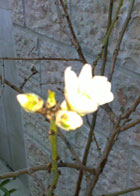 Tu b’Shevat: What Sorts of Trees are We?
Tu b’Shevat: What Sorts of Trees are We?Friday, January 29, 2010 | Jewish Ideas Daily » Daily Features
Deuteronomy 20, discussing the laws of war, and in particular siege, forbids the cutting down of fruit trees, adding, in an ambiguous and tantalizing phrase, "ki ha-adam etz ha-sadeh." The words can be translated as a simple if enigmatic statement ("for man is a tree of the field") or as a question (in the rendering of the JPS Torah,"are trees of the field human?"). The classical commentators were likewise divided. The Talmud, reading the phrase as a statement, is moved to offer a prototype of a human "tree of the field": a virtuous sage, a worthy teacher and role model. Rashi, the...
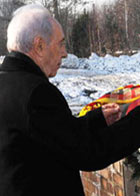 Holocaust Days
Holocaust DaysThursday, January 28, 2010 | Jewish Ideas Daily » Daily Features
Yesterday, Shimon Peres delivered an address, in Hebrew, before the Bundestag as Germany and other nations marked International Holocaust Day, commemorating the date in 1945 when Soviet forces arrived at Auschwitz. Israeli and American Jews conduct their own Holocaust remembrances in the spring, on the anniversary of the Warsaw Ghetto uprising. Ultra-Orthodox Jews, uneasy with the Zionist emphasis on force and resistance, hold their memorials on the tenth of Tevet, one of the traditional fast days for the destruction of the Temple. In short, the Holocaust remains as open to interpretation, reinterpretation—and misunderstanding—as is the hole it blew through all the history...
Editors' Picks
Why Joshua? Meir Soloveichik, Jewish Ideas Daily. What is truly celebrated on Simhat Torah: the fact that the Torah has been completed, or that its reading begins again? The choice of the day's Haftarah, and the history of that choice, offer a clue. (PDF, 2010)
Absolute Citron Miriam Krule, Tablet. "It's easier to grow 2,000 acres of oranges or lemons than to grow one acre of etrogs," says California citrus farmer John Kirkpatrick, the only large-scale grower of the fruit in the U.S.
Why Fast? Elli Fischer, Adderabbi. Expiation, corrective, a reflection of mood, or sensitization to the plight of the needy? Only one of these reasons has biblical support.
Paradise Regained William Kolbrener, Aish.com. A literary encounter with Paradise Lost helped one graduate student access the poetry inherent in the Jewish idea of repentance.
At the Bar of Justice Eliezer Segal, Jewish Star. In envisioning the great annual "day of judgment," the ancient rabbis and poets invoked legal and military images drawn from Greek and Roman life.
Obama's Advice for Your Rabbi Tevi Troy, Wall Street Journal. Just in time for the High Holy Days, the White House is giving rabbis political talking points to take to the pulpit.
Loaves and Wishes Vered Guttman, Washington Post. On Rosh Hashanah, cuisine becomes a system of meaning. (With recipes)
Meet the American Shul Emily Katz, H-Net. Everything you ever wanted to know about the history, the mores, and the character of "the most significant institution in the life of [American] Jews."
It's a Bird! It's a Challah! Leah Koenig, Forward. Rolls shaped like birds, symbols of divine protection and mercy, are among traditional Ashkenazi foods for Rosh Hashanah and the meal before Yom Kippur.
The Three-Week Challenge Erica Brown, Text & Texture. The mourning rituals of the period leading up to Tisha b'Av (this year on August 9) are largely foreign territory to non-Orthodox Jews; but doesn't everyone know the meaning of loss?

